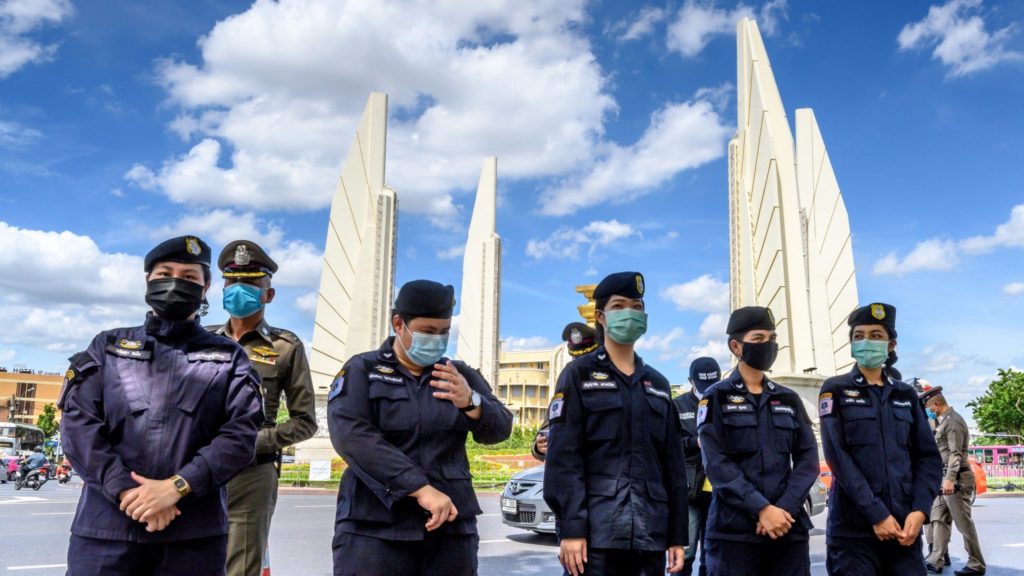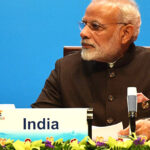
Thai society has watched the Royal Thai Police commit acts of professional misconduct, brutality, corruption, and violations of human rights without action by the government to reign it in. The youth-led pro-democracy protests have again afforded the police another opportunity to commit acts of brutality on Friday, re-arresting three of the most high-profile movement leaders— rendering one unconscious from an unnecessary chokehold.
Countless video clips and photos captured from the event showed Panupong “Mike Rayong” Jaadnok slumped over and carried from a police van that took him from Bangkok Remand Prison to the Pracha Chuen police station before being taken away by ambulance. These acts of professional misconduct and needless brutality are commonplace and are becoming normalized—just a few weeks after police fired water laced with chemicals from cannons at protesters in October. Or who can forget the manhandling of activist Jatupat Boonpattararaksa near Democracy Monument?

While police tactics have been the topic of conversation for weeks, the reputation of the police as an institution has remained scarred for decades. It was only this past August that a major in the Royal Thai Police was killed in a shootout at an underground casino on Rama III Road. It marked another stain on the record of the institution and on the record of Prime Minister Prayut Chan-o-cha who has failed to craft meaningful reforms.
These stories are all too common. Foreign tourists have reported threats and intimidation from corrupt police officers. Serious cases of professional incompetence have hurt Thailand’s national image, particularly in the case of two murdered British backpackers when police mishandled crucial DNA evidence.
The Royal Thai Police has always had a notorious reputation, dating back to the rule of Field Marshal Sarit Thanarat. The police were key figures in the human rights atrocities committed against student protesters in both 1973 and 1976, after which there were calls for reform that led to only minimal changes. Police were involved in the crackdown of the 1992 protests—and reform calls fell again on deaf ears.
During the Thaksin Shinawatra era, the police were commonly associated with corruption and fierce loyalty to Thaksin, accused of doing his bidding in the Deep South and in Thailand’s war on drugs. Police were later accused of abducting and killing of human rights lawyer Somchai Neelapaichit, who advocated for the rights of Muslims. The police have become a political tool for whomever is in power, seemingly switching allegiances from being the so-called “tomato police” to working in concert with the National Council for Peace and Order (NCPO) to silence regime critics.
Reform hasn’t come easy and history is replete with failure. After the 2006 coup the Police Reform Committee (PRC) was set up and led by Pol. Gen. Vasit Dejkunjorn, who called it “an inherited product of the country’s age-old feudalist governing system” that is “constantly criticised for negligence, bias, abuse of power and brutality.” Vasit’s committee recommended decentralization, reforming the way promotions are earned, involving public opinion to enhance institutional reputation, an Independent Committee of Complaints (ICC) to oversee police performance, and movement toward a community-based policing model.
It failed.
The lack of political will and continuity in Thailand is partially to blame. The 2017 Constitution requires police reform, but it has never arrived. Prayut had pledged in the past to take personal responsibility for police reform, but has been slow to act. The police have been under the direct supervision of Deputy Prime Minister Prawit Wongsuwan, but he has chosen to develop close relationships with top-ranking police officers rather than pursue serious reforms.
One of the most serious problems in crafting and implementing police reform in Thailand is the method of handling public complaints and the manner in which personnel would be held accountable for those that are deemed credible and actionable. The 2006-2007 Police Reform Committee may have been correct in calling for an independent committee to oversee complaints, partially because of institutional weakness on the part of existing bodies, such as the National Anti-Corruption Commission (NACC), the National Human Rights Commission (NHRC), and the Office of the Ombudsman. Two of these bodies have had very public scandals and humiliations.
The NACC has been accused of political bias in its clearing of Prawit in his high-profile luxury watch scandal, while the NHRC has been politicized and robbed of its stature in the eyes of the international community. The Global Alliance of National Human Rights Institutions (GANHRI) and the United Nations Human Rights Council downgraded its global ranking in 2015. It has since become a mouthpiece for the government.
While Thai society waits for substantive reforms of an institution deeply despised and devoid of public trust, the Royal Thai Police, under the supervision of a regime fighting for its survival will only cause further injury, public humiliation, and abuse.
Pro-democracy protesters recently submitted a list of 10 demands of the Thai monarchy, which included an investigation into the killings of civilians who were critical of and were connected to the monarchy. It is time for a citizen inquiry into the role of the Thai police, who have become a convenient political weapon for a heavy-handed state.
While calls for monarchical reform have split the country, calls for police reform should find little dissent. If reform cannot be had in a timely, inclusive, and transparent fashion, it is time to “defund” the police—meaning reallocate funds away from the institution to other institutions more capable of performing similar tasks. The only problem with that logic is that it takes transparency, accountability and a functioning democracy for that to occur.






